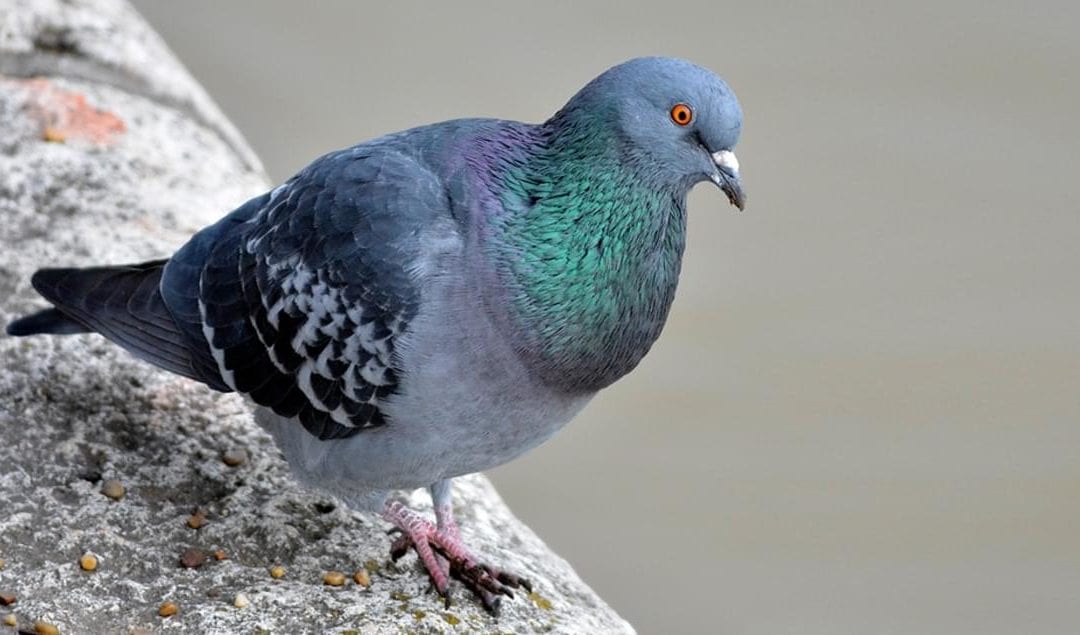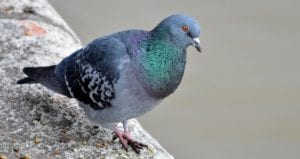A team of researchers from the University of London and Monash University has found that pigeon pecking order is driven by weight and that a given pecking order can be artificially changed. In their paper published in the journal Biology Letters, the group describes their study of the pecking order of domesticated pigeons and what they learned about them.
The term pecking order has come to be used as a way to describe the hierarchy that exists within a group of animals, including humans. Typically, those at the top of the hierarchy have better access to food or a mate, while those at the bottom must scramble to get by. In this new effort, the researchers looked at pecking order in pigeons at the Royal Veterinary College of the University of London. The pigeons housed there are used for homing purposes—nine are female and eight are male. They are all six years old and differ slightly in size. Over the course of the three-year study, the birds were given access to food and water and no other birds were included as part of the group. The group was closely watched for a period of time at three points during their annual cycle. Also, at 19 months into the study, the researchers affixed small weights to the smallest of the pigeons.
In studying the birds, the researchers found that they had a clear hierarchy, with the larger birds at the top and the smaller birds at the bottom. Those at the top of the hierarchy were first in line when food and water were given, while those lower down had to settle for less food by the time their turn came. The researchers found that the larger birds were more aggressive, which is why they got their way when feeding. Things changed dramatically, however, when the researchers added the weights to the smallest birds. With the increase in weight, the birds grew more aggressive and very quickly moved up the hierarchy, eventually arriving at the top. And they remained at the top of the hierarchy until the researchers removed the weights. At their suddenly reduced weight, the birds lost their aggressiveness and slid down to the bottom of the hierarchy once again.
The researchers note that their study shows that aggressive traits in an animal can be modified simply by changing a physical attribute such as weight. They suggest their findings indicate that people feeding bread crumbs to birds at a park may be making them more aggressive.
Pigeon Patrol Products & Services is the leading manufacturer and distributor or bird deterrent (control) products in Canada. Pigeon Patrol products have solved pest bird problems in industrial, commercial, and residential settings since 2000, by using safe and humane bird
deterrents with only bird and animal friendly solutions. At Pigeon Patrol, we manufacture and offer a variety of bird deterrents, ranging from Ultra-flex Bird Spikes with UV protection, Bird Netting, 4-S Bird Gel and the best Ultrasonic and audible sound devices on the market today.
Voted Best Canadian wholesaler for Bird Deterrent products ten years in a row.
Contact us at 1 877-4-NO-BIRD,(604) 585-9279 or visit our website at www.pigeonpatrol.ca
Pigeon/Pigeon Patrol / Pigeons Roosing / Vancouver Pigeon Control / Bird Spikes / Bird Control / Bird Deterrent / PIgeon Deterrent / Surrey Pigeon Control / Pest / Seagull deterrent / Vancouver Pigeon Blog / Birds Inside Home / Pigeons in the cities / Ice Pigeons / What to do about pigeons / sparrows, Damage by Sparrows, How to Keep Raccoons Away, Why Are Raccoons Considered Pests / De-fence / Pigeon Nesting / Bird Droppings / Pigeon Dropping / woodpecker control / Professional Bird Control Company / Keep The Birds Away / Birds/rats/seagull/pigeon/woodpecker/dove/sparrow/pidgeon control/pidgeon problem/pidgeon control/flying rats/pigeon problems/ bird netting/bird gel/bird spray/bird nails/bird guard


